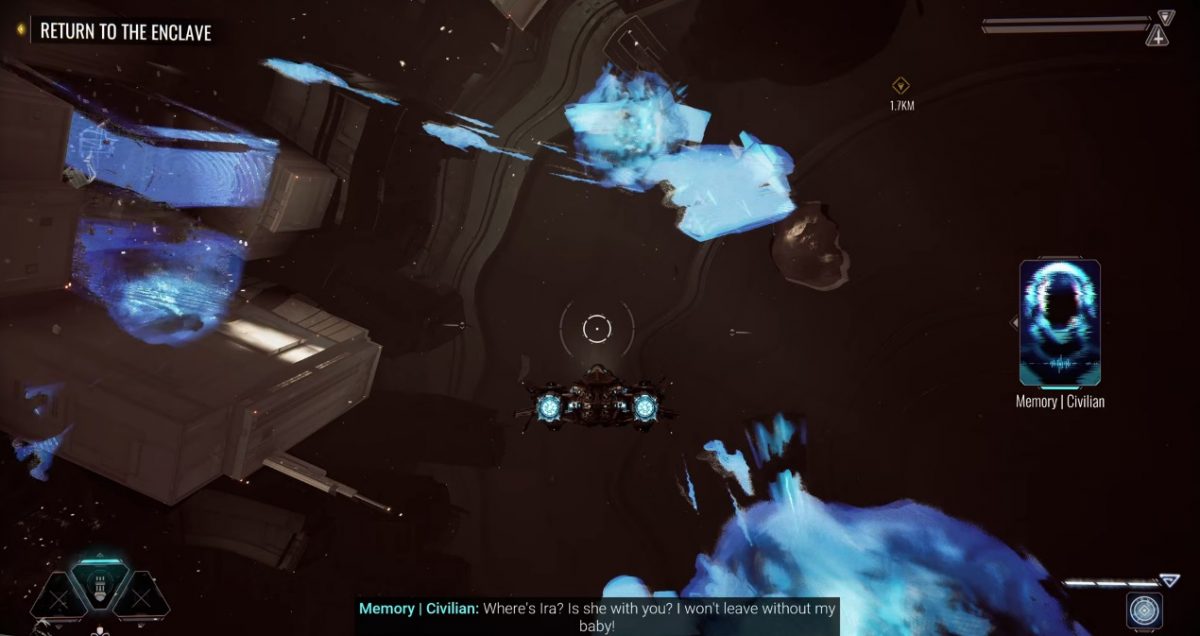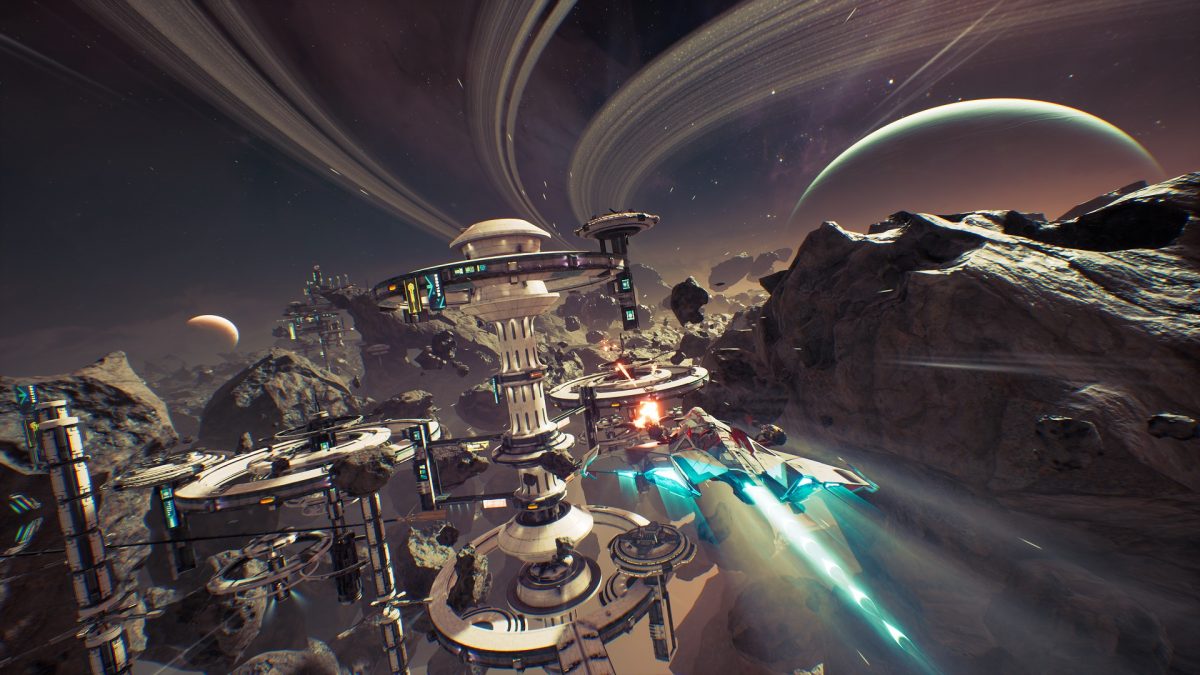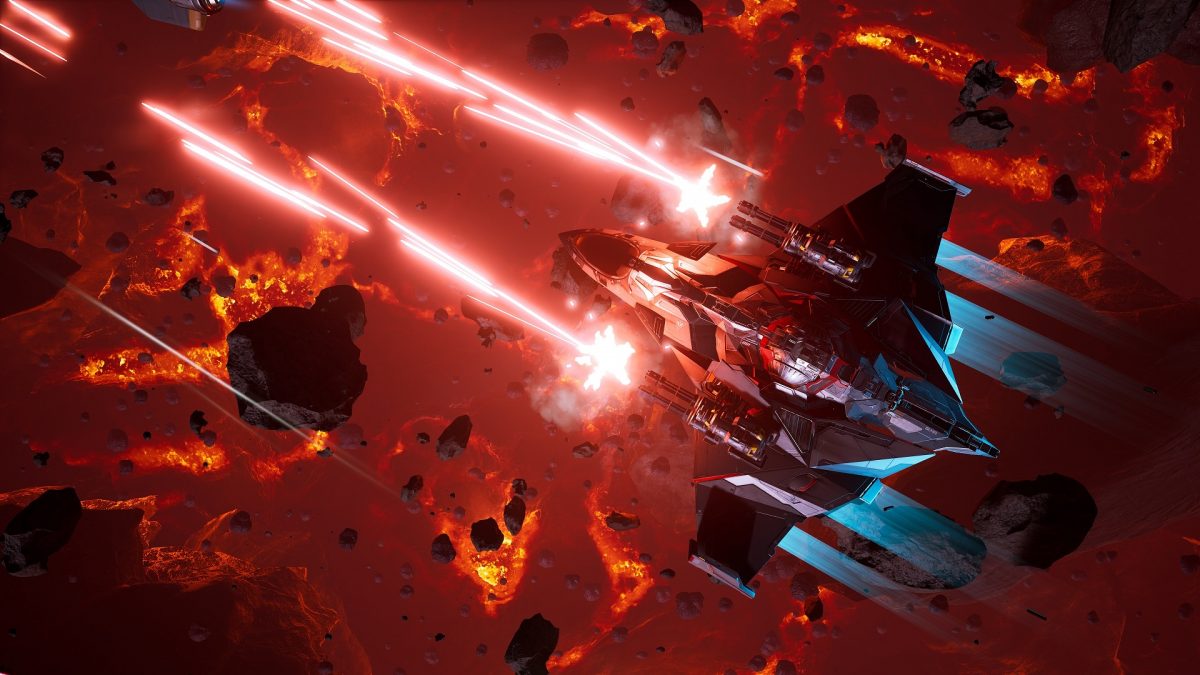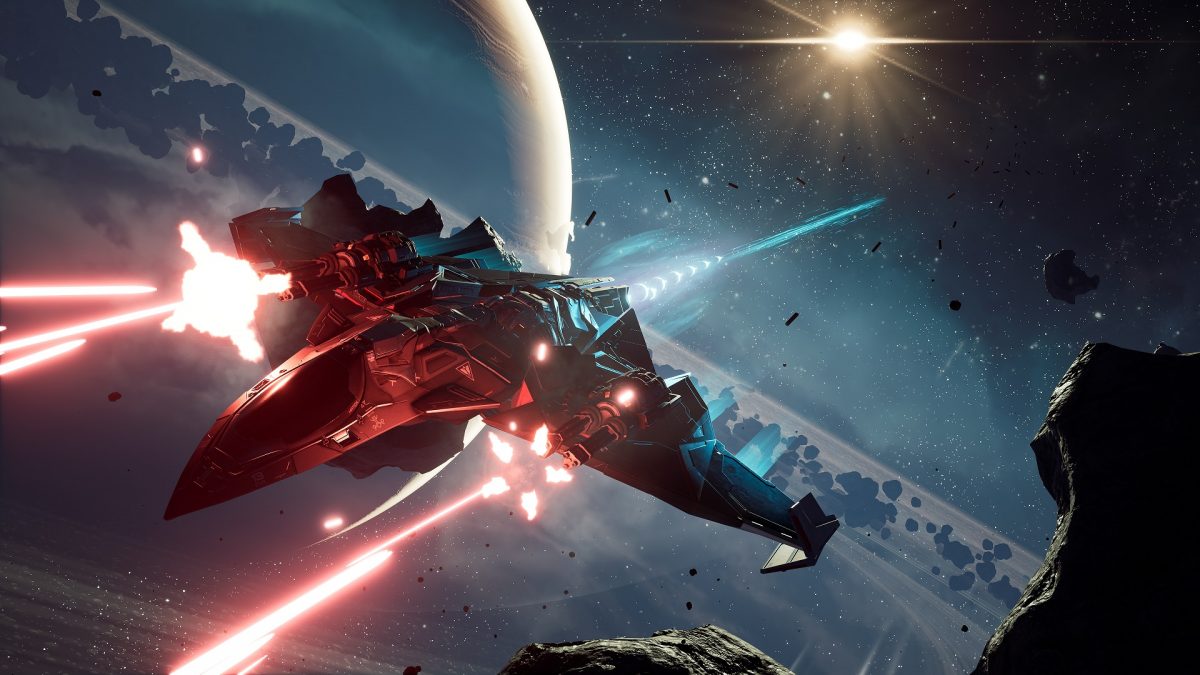Sleek flight controls, thrilling battles, and engaging Sci-Fi story easily overshadow any flaws you’ll find in Chorus, which hits consoles/PC today.
Since it’s initial reveal during the big next-gen Xbox showcase in 2020, I’ve been eagerly awaiting my chance to get my hands on Chorus. For one, dogfighting/space battle games (Star Fox, Rogue Squadron, etc) is my favorite genre aside from RTS. Secondly, I’m a sucker for Science Fiction settings pitting a resistance against a larger Empire/cult. Third, it looks gorgeous.
Chorus the Game
Developed By: Fishlabs, Deep Silver
Platforms: PlayStation 4|5, Xbox Consoles, Stadia, PCs
Release Date: December 3, 2021
All in all, Chorus felt like a game designed specifically to capture my attention, and I’ve been chewing up just about any footage and gameplay details I could since that reveal a couple Summers ago. Over the past couple weeks, I’ve had the chance to actually play the game, and the experience has been nothing short of incredible.
I’m not sure it’ll appeal to everyone (I’ll get to this in a bit), but it’s an insanely fun time with polished gameplay that keeps me coming back. Let’s dive into it a bit more!
Despite incorporating a number of open-world elements, Chorus is very much a narrative driven game (one of the things I love about it). The story puts you in the role of Nara, an ace pilot who has built up a reputation as an incredible fighter and someone who can get things done.
The main reason for that, is Nara was once part of ‘The Circle,’ a galaxy spanning cult led by the Great Prophet who seeks to cleanse humanity and bring peace through sheer, overwhelming, force. It doesn’t hurt that they’re also able to tap into the strange powers of ‘the faceless.’ Existing out of space and time in the Void, these seemingly divine beings offer unique psycho-kinetic powers the Circle can use to enforce their will.
Nara, was once the Great Prophet’s top enforcer; her skills unmatched and her faith in “the Chorus” absolute. Until she unwittingly let the corruption of the Faceless overtake her, resulting in a void opening that managed to destroy an entire planet…

Don’t worry, all this goes down in the opening cinematic, so I’m not really spoiling anything here. Suffice it to say, causing the deaths of BILLIONS of people served as a wake-up call. As a result, Nara vanished, exiling herself to the further reaches of the galaxy, ditching her ship, powers, and allegiances in order to eek out a quiet life where no one would know her.
This is pretty much the point where the game drops you into the cockpit. You’ll fly around, scavenging material, fending off pirates, and helping with various tasks. The maps you’ll explore throughout the game are large. There’s a solid sense of scale (you genuinely feel like you’re in the vast expanse of space), but never to the point where you feel it’s overwhelming.
There’s plenty to do—even if many things are your typical, open-world fetch quests—but I loved tracking down memories. Using your psychic powers, you can tap into echoes of the past to help solve puzzles, or simply learn more about the lore/history of the stuff happening in the game.

Even in the opening area, there are a number of little sidequests to knock out here, mostly used to further acquaint you with the controls/mechanics. Speaking of which, I am absolutely in LOVE with the flight mechanics in this game. From the moment you pick up the controls, everything about navigating to combat feels surprisingly intuitive. Hell, I didn’t even have to go into the settings to fiddle with the controls to make it feel how I wanted it to (something I normally do with modern flying games).
Everything about it feels natural, and even as the story moves forward and more aspects are added, that feeling of natural progression continues. As you go through the game, flying and battles become far more complicated. You’ll be integrating both a variety of new powers, cycling weapons for the best effect against certain enemy types, along with new flying abilities (drifting, strategic boosting, etc).
On top of that, each power/aspect is mapped to different buttons. As such, pulling off specific moves will make it look like your fingers are flying all across the controller. It may sound complicated, and if you think about it long enough, it is…but how the game introduces these mechanics makes them easy to pick up and more enjoyable than some similar titles.

For example, I enjoyed Star Wars Squadrons and it’s flying action, but the controls there rarely felt intuitive. If you took a week away to play something else (or just got busy), you pretty much had to completely reacquaint yourself with the controls/get some practice in or risk getting your ass handed to you right away.
Chorus doesn’t have this problem, and even if you need a bit of a refresher with your starfighter, the semi-open world gives you all the freedom you need to play around before getting hammered in battle.
In some ways, the control scheme and implementation of mechanics reminded me of Prince of Persia: Sands of Time and how it handled the parkour elements. It wasn’t a simple matter of holding down a specific button and moving (one of my biggest issues with how Assassin’s Creed decided to handle things), but required a combination of inputs to make the magic happen.
It’s the same with Chorus, but the result is looking like the ultimate badass pilot out of your favorite space-related movie. The sense of accomplishment when you pull off a particularly flashy maneuver from your bag of tricks, is genuine. Seriously, there’s no feeling quite like, boosting past an enemy, only to hit a drift that whips you around, putting them square in your crosshairs…
Anyway, things in your new life are going pretty ‘ok.’ There’s the occassional pirate to deal with, but nothing on the scale of planet eradication that will continue to haunt you…Unfortunately, as is normally the case, this way of living couldn’t last forever. The Circle’s influence has continued to spread. Now, it’s coming for Nara’s new slice of life. In order to protect the people and prevent another mass destruction event, Nara decides it’s time to take the fight directly to the cult and prevent them from destroying any more planets.
To do this, however, you (as Nara) will need to recover your old ship and embark on a quest to recover the powers (referred to as Rites) you had previously burned out of yourself. Doing that, however, comes with its own problems as your ship, Forsaken, is none too happy about being left behind/hidden away.
That’s right, your ship is sentient and serves as much as a companion on your journey as a tool to fight back. This dynamic makes for a lot of fun elements in the story, as Forsa provides insight to Nara’s previous adventures, and gives a more tangible reason to care for your vessel (finding the best upgrades and such) beyond simply needing to be stronger.

As the journey continues, Nara and Forsa find themselves traversing the galaxy, exploring mysterious temples, and kicking all manner of ass. Even as you fight back against the Circle, more threats appear in the form of splinter factions and even pirates. The story has some interesting ways to deal with those, however, as there’s even an optional sidequest to try and unite the pirate clans to aid in your fight; keeping them off your back while exploring.
By and large, the story of Chorus hits a whole bunch of familiar beats in the Sci-Fi/Space Opera genre. You won’t necessarily find anything that complete flips the script, or breaks new ground, but that doesn’t mean it’s a blast to play through. In fact, because those familiar elements are handled so well, it felt more like revisiting some of my favorite stories, rather than feeling like a copy and paste affair.
The biggest problem with the story, and something I think others will struggle with, is how it’s told. As you may have gathered from the trailers, the entirety of the game inside the starfighter. Pretty much the only time you see Nara herself, in or out of the cockpit, are via the cutscenes.

Personally, this doesn’t bother me, and I loved it. Felt like playing some old-school Star Fox. That said, I know it’s something that could certainly be off-putting to other gamers out there. Where it feels like an issue, however, is that any and all dialog (aside from cut scenes) is conveyed via a static image of the person talking that pops up beside your ship. That’s it.
So even as you’re interacting with other characters during important moments (e.g. being attacked, or looking for a lost loved one), you only have a still image avatar to look at while listening to them. Without the visuals of the character body language or even facial expressions, it’s tough to feel any connection to things going on. While I enjoyed the story overall, there’s a general disconnect to it due to how we get the majority of the story/interactions.
Along this same train of thought: Chorus is, for the most part, absolutely gorgeous (I played the PlayStation 5 version, by the way). Just stunning ship designs and zipping around asteroids and hideouts dazzle the eyes. I was blown away by how good the game looked, and the amount of detail thrown in even while you’re flipping around, dodging laser blasters and throwing psychic powers about.

That said, it’s obvious the game was always meant to be viewed from the perspective of your starfighter. The character models are a bit rough, feeling more in line with something you’d see from early in the last generation, rather than a more recent game.
The first time I saw Nara in a cutscene, I was completely thrown off. The graphical difference between her and the ship that’s your primary point of view was striking. It’s not horrible, just odd considering how impressive the rest of the game looks.
The only other issue I can see some gamers having, is that Chorus comes in right around 12-ish hours of playtime if you’re just focused on the main story. Obviously you can sink in much more time (I know some already up to 25+ hours) by hitting all the side missions and tracking down collectibles. I freaking love it. I’ve long thought many games have gotten too long-winded,and not just because my time is more limited with all the kids in the house. Several don’t seem to know when to cut off the story, and things begin to drag.

My favorite games in recent memory know how to balance those larger open-world elements, while keeping the pacing of the story in check (Ghost of Tsushima immediately springs to mind along with Spider-Man: Miles Morales). In this regard, I think Chorus’ smaller game time was the right choice. It keeps the story moving at a fast clip, keeping you from thinking too long on the cliches you encounter and highly engaged in the action.
For those who enjoy their games super long with hours upon hours of exploration available, Chorus might be a tougher sell. That said, what you get in those 12-15 hours is a blast and a lot of bang for your buck (even the next-gen versions are only $40). There are definitely worse ways to kill a few days during your winter/Christmas break!

